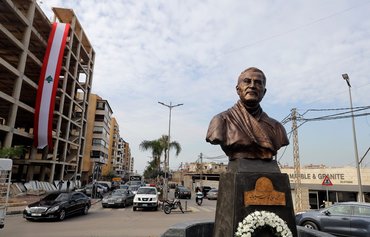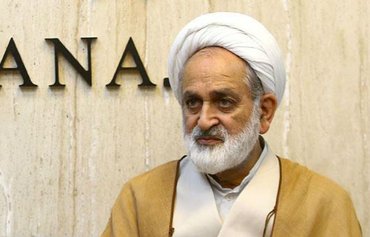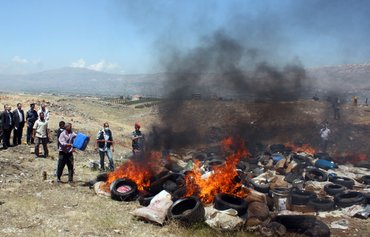Recent statements from Qassem Soleimani, who commands the elite Quds Force of Iran's Islamic Revolutionary Guard Corps (IRGC), confirm Tehran is continuing its expansionist policy in the region through the use of armed militias.
Speaking to an Iraq-Iran war veterans gathering in Kerman province on July 3rd, Soleimani boasted of the Syrian regime's rising fortunes and described it as "undefeatable".
"Several years ago in Syria, we did not have relations with individuals and movements more than the numbers of fingers, while we have relations with hundreds of thousands today," he said.
Soleimani also exalted the rise of the Iraqi popular mobilisation forces (PMF), an umbrella organisation dominated by IRGC-backed factions.
Support for the Syrian regime
According to military reports, around 5,000 IRGC troops and Basij paramilitary militia fighters are active in Syria, in addition to 3,000 to 5,000 Lebanese Hizbullah fighters and about 20,000 from Afghan and Pakistani Shia militias, known as the Fatemiyoun division and Zainabiyoun brigade.
"The Syrian regime would have fallen without its allies," said strategy expert Brig. Gen. Elias Hanna, a retired Lebanese military officer who writes about the Middle East and terrorism.
The turning point came when Hizbullah and other IRGC-backed forces entered Syria, he told Al-Mashareq, explaining that "this turned the Syrian conflict into a regional one".
Hanna said Soleimani was referring to the Syrian regime in saying Iran now has a "strong relationship with hundreds of thousands of people with whom it previously had a weak relationship".
"When you talk about Iran in Syria, you talk about Iran's relationship with the Syrian regime," he said.
The threat posed by Iran's expanding influence and its military intervention in the region is undeniable, Hanna said.
But it does that "by proxy", he said, by motivating, organising and arming Shia fighters and using them within certain areas. In Iraq, there are IRGC-backed militias within the PMF, and in Syria there are forces from Afghanistan, Pakistan, Iraq and Lebanon.
Hizbullah missile factories
Soleimani's statements coincided with reports that Iran is constructing two missile factories for Hizbullah in Lebanon.
On July 10th, French magazine Intelligence Online published details about the factories, which are being built at two different sites, 50 metres below ground.
One of the factories is being built in the Bekaa Valley's Hermel region, the magazine reported, and is producing the Fateh 110 missile, which has a 300-kilometre range and is capable of carrying a 400-kilogramme warhead.
The second factory is located on the south Lebanese coast in al-Zahrani area, between the cities of Tyre and Sidon, according to the magazine.
"It is not surprising that Hizbullah is developing its arsenal of missiles," political writer and analyst Asaad Bishara told Al-Mashareq.
"Hizbullah is totally aligned with Iran, and is not only one of its arms but a key agent that Iran uses not only in Lebanon, but throughout the region," he said.
Opening a Beirut-Damascus corridor
Soleimani's statements clearly reveal that Iran's strategy is to establish a land corridor from Tehran to Beirut through Baghdad and Damascus, Bishara said.
"This strategy is being implemented gradually by using all its arms in the region," he said.
"We are seeing an Iranian [regime] strategy that wants to control not only four Arab capitals, but more," Bishara added.
Military analysts have said that Iran's main interest is to maintain a foothold in Syria, because it is the primary focus of its strategy to establish its hegemony.
Losing this presence would threaten Hizbullah's existence in Lebanon, which itself represents a key component of Iran's regional strategy.

![Lebanese women walk past a portrait of the founder of Iran's Islamic Republic, Ayatollah Ruhollah Khomeini, in the southern Lebanese city of Saksakieh, on November 27th, 2015, during the funeral ceremony of Ali Tanana, who was reportedly killed during battles in Syria's Aleppo fighting alongside Lebanon's Shia militia Hizbullah. [Mahmoud Zayyat/AFP]](/cnmi_am/images/2017/07/18/8809-hizbullah-iran-women-600_384.jpg)







I want reform ...
Reply1 Comment(s)